This is our first trip in our new post retirement life. We are one week into our 3 month stay in Gondar (Ethiopia). Since arriving, we have worked solidly every day of the week, to get ourselves immersed into our volunteering roles (Sylvie teaches English to school children and to local community leaders, while Jeff reviews poverty levels and helps families to generate income with new trades via micro loans; there is also a lot of crossover where we help each other). Once we have acclimatised to the way of life here, we plan to visit the surrounding countryside and the Simien mountains which are meant to be majestic and are world famous. So, here goes with our first impressions…
Living in a compound
As part of our voluntary work, we have visited families living in compounds to assess sponsorship needs. Their poverty levels are far worse than we could possibly have imagined. The typical compound is surrounded by corrugated iron with one wealthier family (often in a brick and mortar house) and their tenants who live in two to twenty dwellings (in the case of the poorest families). In between compounds, there are dirt paths, often quite treacherous, with dirty water running in the middle. That common space is shared with numerous animals and serves as a children’s playground and as a storage area for construction material such as mounds of sand and also as a drying area for chilis (on pieces of tarp). In the case of the poorest families, dwellings are simple structures of mud mixed with straw over a frame of tall thinnish wood branches with a corrugated iron roof in the best of cases, pieces of tarpaulin in the worst. Floors in every instance are beaten earth. At the poorest end (where we visited), each dwelling is a one room space of about 6 square metres. Living in the house is normally a family of 4 on 2 beds – typically a mother and three children (the father having died young or run away from his responsibilities). It is not infrequent however that more people might live in one room (very often one or two grandparents, additional children or other close relatives). Inside each dwelling, in the worst of cases, there is only room enough for two small rope beds on wooden frames, often without proper mattresses, on which all the members of the family sleep. There might, in addition, be a couple of stacked cardboard boxes or wooden crates containing a few cooking or eating utensils and possibly a few hundred grammes of flour or legumes. Extra clothes to change into, when they exist, are kept in plastic bags like the ones in which you buy food at the market, hung to a nail on the wall. They cook outside on an open fire and share a pit latrine with all the other families in the compound and also share a water hose for washing/drinking. Yet, because water is not included in their rent, they often restrict their water usage to drinking and cooking only. One of the mothers we met had HIV and lived with her young children in a room off a bar full of drunk men. When the men are drunk, they often become aggressive and the family is often at the receiving end of abuse. One mother we met feared for her children’s safety and expects things will get worse as they grow up. With all of this hardship, the families we met were absolutely charming, smiling and laughing with us, and they showed no sign of envy whatsoever at our clean clothes and privileged background. By the end of our visit, we were only too delighted to return to our relatively deluxe accommodation.

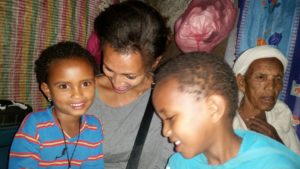
Hotel
Our hotel, Zoz-amba, is conveniently located near to where our Ethiopian colleagues live, so the restaurant doubles up as our dining area and as our headquarter/meeting place when it is not busy. It is a budget hotel as this trip is meant to be “an experience” rather than a holiday for tourists at tourist prices. Besides, paying £50 per night would soon mount up over 3 months and £9 per night is more in line with what the Ethiopian middle class will pay for a double bedroom as our hotel is full of local business men. Needless to say, our hotel is perfectly unaffordable to anyone who lives in a compound. But our choice comes at a price. Yes, it’s clean and has occasional hot water and intermittent wifi, but wow, do things need fixing! All the furniture in every room is broken and none of the TVs work throughout the hotel and worst of all, the plumbing really needs repairing! Incredibly, we have visited “luxury” hotels for lunch and their plumbing is no better. Whoever came up with the decoration for our hotel and others we have seen are frankly aesthetically challenged. As for the way the hotel is built, the lack of skill or tools make it look like something that was designed by the architect Amonbofis from the graphic novel Asterix and Cleopatra.
At School
Sylvie has started to teach in a before/after school club. The children go to government run schools but only if their families can afford to send them (some children work to support the family) and once there, they have either a 3 hour morning or afternoon session, five days a week. In their classroom, they suffer from trying to learn with 60 to 90 in a class under one teacher, so their learning will always be improved with charity run clubs. Our club is a rather run down mud and wood structure of two classrooms and one small storage/office area around a 5 square metre courtyard which acts as a playground. The classrooms have no lighting at all beyond the light coming in if the door remains open, there are no proper desks or chairs (a few wooden benches and plastic garden chairs), there is a small white board on a bench slanting against a wall and a shared pit latrine. Incredibly, despite the severe lack of resources, the club has 24/7 security guards to look after the property and its limited contents (labour is cheap, books and materials are not). All that said, the children are gloriously happy and so keen to learn. The great news we learned today is that we have a grant from Pears Foundation to carry out some of the improvements the club needs, like a tap for the children after using the latrines, so we will work on that over the coming weeks.
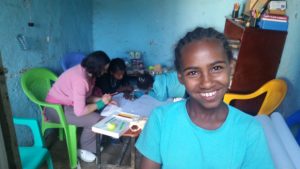
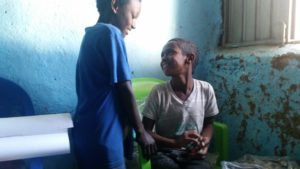
Gondar Hospital
This week, we visited a sick boy of the community in Gondar’s hospital. Wow. The lack of hygiene and privacy was shocking beyond belief. We will never complain about the NHS again! The young boy had just had an operation for a bone infection in his leg and was in a ward with lots of older men. He was surrounded by lots of family which was at least refreshing over our bureaucratic two chairs to the bed rule, but that also meant more germs and a lot more noise and crowding as other patients also had visitors. There was a hand sanitiser by the door-less entrance to the ward, but we were laughed at when using it as it was meant only for the doctors visiting!
Racism in Reverse
It has been sad to experience racism in reverse where, as white “faranji”, we are treated as more intelligent and trustworthy than locals. After leaving Gondar’s hospital, we casually asked our Ethiopian friends why their bags were checked. They advised that “the guard wanted to make sure we didn’t steal any drugs”. OK, we responded, “but why didn’t the guard check our bags?”. “Because you are white”, came the answer. We promptly walked straight back to the guard and asked him to check our bags!
Faranji in the land
As foreigners, “faranji”, we are of course fair game. Prices are, as a matter of course, inflated, sometimes outrageously, for us. On a few occasions but not many, people will mutter sometimes as we pass by with a plan to get business out of us, like a trekking trip, or just go all out to rip us off. This being said, we experienced nearly next to no racism as such, just a mild “they are not African so they cannot understand” kind of xenophobia , like a feeling of smugness and superiority by a few Ethiopians. The vast majority of people have been fair and honest with us and moreover have been caring and generous with their time, knowledge and sometimes even possessions. They have shown us trust, sympathy, gentleness and good cheer.
Liberty
We love the utter freedom which children have playing in the street in safety with so few cars and without adult supervision. Some beg for bread, others just smile widely at us. The smiles turned to laughter when we visited Gondar’s public library and chatted to the children and librarians there. Such a joy to see children loving their books, but there were sadly many empty shelves and very few modern books. Liberty is not so widespread in any administrative matter here: for example, we could not just buy local SIM cards, but had to buy and register them and our local mobile phones at the Post Office after presenting our passports.
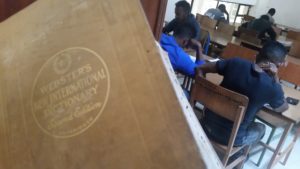
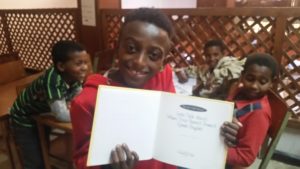
Equality
Social equality is also absent, like in most countries. Once the capital of Fasil’s empire in the 17th century and a major trading post, Gondar boasts Unesco heritage sites (which we have not yet had time to visit) but the town has long since fallen into a state of disrepair and attracts very few tourists. Living here feels, by European standards, like what Dickensian London may have looked like, with everyone selling off street pavements or in poorly constructed shops. There is certainly a middle class here as owners of properties rent to the poor and look over them in the compounds from brick-built houses. Ethiopia is made up of 100 million people mostly living in the countryside, with only 20% in urban areas, yet the commercials on national television clearly advertise for a people with a standard of living enjoyed by middle class Europeans, and they are largely concentrated in Addis Ababa.


Fraternity
We adore the way everyone greets each other on the street with so much love, it is so refreshing to the cold blank looks we too often see in London. The people we work with are simply wonderful and the children delightful. The Ethiopian greeting is very distinctive. When shaking hands (a loose handshake with the hands lying limply each in the other), a sign of respect is for a person to hold their right forearm with their left hand as if the left hand reinforces the gesture of the right one. In friendship, people will also touch right shoulder against right shoulder in a funny kind of half hug. In addition to touching shoulders, two women greeting will exclaim loudly and often kiss the air near each other’s cheek.
Synagogue
Gondar has several thousand Jewish families dating back to the time of Solomon – the story goes that the Queen of Sheba once visited King Solomon and brought back with her a retinue of craftsmen and soldiers from Judea. Later, angry at the destruction of Solomon’s temple, priests joined them and legend says they brought with them the Ark of the Covenant and safely secured it in what is now a church in Axum. Until the seventeenth century, Jews were prosperous and well respected, at one time they even had their own kingdom. Later, they were members of the king’s administration and government when Gondar was the capital of what was then Abyssinia. Today, Jewish families, like others, live under desperate conditions. Many of them have recently emigrated to Israel as Beta Israel, also known by the derogatory name Falasha (meaning outsider), but thousands, often arbitrarily called Beta zera Israel, remain due to various factors. We visited Gondar’s synagogue for a Friday night service which was attended by over 300 all singing their hearts out in fluent Hebrew, dancing in the aisles and ululating. We have never in our lives seen so much joy in the welcoming in of Shabbat, the Jewish Sabbath. Such a privilege to have witnessed something which is likely to disappear if Israel accepts the immigration of the remaining Jewish families.
Food
We have had to search for dishes which are not injera, the national dish eaten every day by most Ethiopians, especially in poor communities. Injera – a spongy very sour pancake topped with sauces and vegetables or meat, sometimes even raw meat – is in fact lovely but eating it every day can become tiresome with our ingrained expectations of privilege. Also, the typical Ethiopian diet relies very little on vegetable and a lot on salads which we have not dared try. Thankfully, we found a nice restaurant serving foul and the bigger hotels serve fairly decent Western food too. Some great discoveries we have made are Lowze tea which is basically peanut butter with hot water and of course the famous Ethiopian coffee which is fresh (45 minutes from beans washed and freshly roasted to served), strong, thick and delicious and often served as part of a ceremony. As part of our volunteer exercises we are undertaking to assess the level of poverty in the Gondar community, we need to consider the number of litres of coffee consumed by a household per month (coffee being expensive) – when we challenged that would not be a great indicator of poverty if the family does not like coffee, we were told definitively “ALL Ethiopians love coffee”!

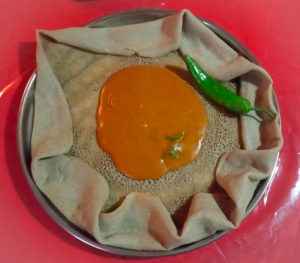

Hello
I am very happy to see your blog.
Thank you
So much respect for the two of you
Keep the updates coming! Person to person 😊
Wish you could be with me!
Wonferful. I would love to be with both of you. But to late.!!!!
Love you. Ralph
It’s never too late! Much love xx
Wow, you guys are so special! I am looking forward to keeping up with your experiences from the safety and comfort of my living room! Love to you both!
Love it! We do sometimes long for some creature comforts. We would ask you for a care package, but post here is impossible as there are no street names never mind numbers on ‘houses’ or post codes.
Happy to try and send anything you need!
Love and energy please!
Great Blog What a experience for you both
Thanks Garry. It is both the best and worst experience we’ve ever had!
Wonderful blog
Lovely to see you and Sylvie making a difference
The charities here are great but they have an uphill struggle as the problems are so vast. We are doing our best to help them but it can be challenging with our lack of Amharic. We met an American professor yesterday who told us that Ethiopia is easily the poorest country in Africa. A salary of £7 per day is above average and considered very respectable. Thanks so much for sorting me out with exercises before leaving, they have been invaluable!
Hi Cousins! Thanks for taking the time to share your work/ travel. It is so fascinating, although my stomach hurts looking at the food !! So great you can help others. Keep me on your blog list. Happy New Year and safe travels. Sending love
Our stomachs hurt too sometimes for real! Unlike Bryce’s wedding food, Ethiopian food is not to die for and hopefully not literally. Much love.
This blog is such a great idea to follow you and understand how you will go out of your comfort zone and be happy with less than basic stuff we all need. Very inspiring. Proud of you ! Love Vivi 💕
Thanks Vivi, we will do what we can to help even if that means just helping 1 or 2 families become self sufficient, but we are also getting something huge from this ourselves through the life changing experiences we have every day and through the closeness and beauty of the people we are working with. Sending love and hugs xx
Dear Sylvie and Jeff so interested to read of your first hand experiences . A very worthy adventure. You will gain so much as well as all the people you are helping. The children sound lovely. Keep us posted.
Hi Carol, Thanks so much! Life here is both beautiful and heart-breaking. And yes, the children are delightful! Love, Jeff and Sylvie
Wow Jeff, what an amazing and wonderful thing you are doing. So much respect for you and your wife. Really enjoyed reading your blog. Take care and happy new year. Look forward to seeing and hearing about it , at walking football in March.
Thanks Kevin! Happy New Year to you too! I am definitely missing our football games, but I discovered today that one charity I volunteer for has a great under 15 football side (Maccabi Gondar!) that just won a cup and is getting sponsorship from an MP back home, while another charity I volunteer for (Kindu Trust) has organised a team of girls from the very most needy backgrounds in order to bolster their confidence and give them some joy in life. I will definitely go along to support them both and maybe even try to get in some football practice, although I don’t think I will keep up with the youngsters. And of course, Ethiopians are known for running stamina unlike me! Take care, Jeff
Jeff and Sylvie
Great work . Good example for the world to see. Those memories will be with you forever
Keep safe
Thanks Gilles! One of the reasons we are keeping this blog is to look back one day when we are too old to do these kind of trips and remember the memories which are indeed really precious and beautiful. Love, Jeff and Sylvie
Dear Jeff and Sylvie
You are both so inspiring in what you are doing and the energy and effort you are giving to the community.
I look forward to reading your future posts.
Much love and may see you next year…..ie come and visit us…….Nicole and Norman
Hi Nicole and Norman, You are our inspiration! It didn’t even occur to us to give up work until you went for it! So, thank you! And yes, we will definitely come out to Oz or NZ to see you wherever you are going to be! Much love, Jeff and Sylvie
Beloved Sylvie and Jeff,
It was fascinating reading what you wrote. This allows us to feel a little of what you are experiencing.
You will probably never be the same, after such a trip.
Looking forward to reading from you soon.
Dearest Daphna and Yehuda, we so wish you were with us! We miss you madly and can’t wait to celebrate being together with you. Love xx
Dear Sylvie and Jeff
What a wonderful fascinating account – I so enjoyed reading it. You seem to have done and learned so much already. Very impressed at the way your coping with the conditions and most of all your enthusiasm for everything shines through.
Really looking forwards to reading your next blog
Much love
Gill
Thanks Gill! We’re loving life out here. If there’s one thing we miss it is a variety of food and in particular your food and your company of course! Much love and happy new year! Jeff and Sylvie
Very proud of you two. And admiring. What an extraordinary experience!
We are split between wishing we were with you, helping the people there, and being egoistically happy we are here enjoying our comfort. Thanks for sharing your experience with us. Nice writing style by the way, really enjoyable. If you can, please post more photos, so that we could have a better idea of what things look like.
More photos loaded up! We have taken close to a thousand photos so it was difficult to choose just a few. Everywhere we look is worthy of a photo, although we refrain from taking intrusive photos of the many families struggling in their homes and on the streets. Can’t wait to see you all when we are back. Much love, Jeff and Sylvie xx
Jeff and Sylvie. Hi. Sounds like you are having an amazing time doing a most commendable thing. I’d once been due to go to Ethiopia on a charity trek but there was violence in the country and it got changed to Tanzania but I would have loved to have gone. Keep up the good work! All the best, Lee xx
Hi Lee, we will definitely be on the first plane home if there is serious violence here. We do here gunshots going off from time to time and it is concerning to see civilians casually walking around town with rifles. We hear that the gunshots are a sign of celebration, but we are always extra careful all the same. Happy new year!
Thank you for sharing your experiences through a blog. I enjoyed reading about your experiences and at the same time realised how truly gifted and blessed we all have been from God and still take things for granted for the privileged life we lead.
Thank you Jeff and Sylvie for this amazing blog!
Hi Rayeesa, Like you, we had not truly appreciated how privileged we are to live even with basic essentials, let alone all the luxuries we have become accustomed to. We are currently planning to come out to India for volunteering in the summer. I will let you know if the plans are realised as it would be wonderful to see you again. Love, Jeff and Sylvie
Hi Jeff. I was so interested to read your update and description of real life in Ethiopia. It’s great you’ve been able to immerse yourselves in it, to help understand the needs of the people.
The conditions you describe for the poorest people are really shocking, and make us appreciate all the things we just take for granted, like a comfortable bed, plenty to eat and access to healthcare. But, I was most interested to see the photos of the kids, who are still so beautiful!
Please do continue posting updates.
Hi Elaine
Another update just posted with lots of photos! You are right about the kids. We have such fun every day with the laundry lady’s little girl, playing games and drawing. We don’t understand a word she says and she doesn’t understand anything we say, but drawing and games break those barriers. We feel so close to all the kids we look after, we are going to miss them so much and just hope we can set up mechanisms which will support them in our absence. Let me know if you are in London in March or early April and we can meet up. Best, Jeff
Hi Sylvie and Jeff,
I’ve only just read about your experiences – wow! is all I can say. Wonderful work you’re doing, though it must feel as if you’re hardly even scratching the surface. Keep writing, and posting such wonderful photos. I look forward to the next episode.
Lots of love,
Audrey